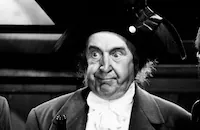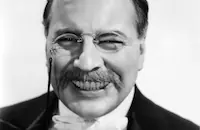A Notorious Gentleman
Cast & Crew
Edward Laemmle
Charles Bickford
Helen Vinson
Onslow Stevens
Dudley Digges
Sidney Blackmer
Film Details
Technical Specs

Synopsis
In Savannah, Georgia, criminal lawyer Kirk Arlen has a reputation for getting his guilty clients acquitted. When he wins a murder case against District Attorney John Barrett, Barrett vows to one day find a loophole in the law which will turn out to be a noose. Among Arlen's enemies is Clayton Bradford, who is engaged to actress Nina Thorne, an old friend of Arlen who is in town for a play. Arlen visits Nina after many years and asks her to marry him, but she refuses, noting that they are both ambitious and loveless, and explains her commitment to Bradford. Nina invites Arlen to a reception being given in her honor by Bradford, but when Arlen arrives, Bradford throws him out. Arlen then decides to commit the perfect crime and murder Bradford. Bradford's nephew Terry, meanwhile, fights his uncle for Nina's attention. Terry, a drunk who was expelled from college for crippling a student while intoxicated, claims he drinks to forget his uncle's vicious treatment of him. The night after the reception, Bradford orders Terry to go to his room and waits for Nina. Arlen enters Bradford's library through a window and tells Bradford why he must kill him: Years ago, when Bradford came to town, he tried to break into the Arlens' prominent social set, but was rejected when Arlen's sister turned down his offer of marriage. She later died of pneumonia, but Arlen blames Bradford for her death because he stole her property and her income. The two men's competition for Nina is the last straw, Arlen says, in a battle that has lasted many years. Arlen shoots Bradford in cold blood and waits for Nina. When she finds Bradford dead, Arlen tells her to go home, then plants her personal articles around the library. Arlen then calls Barrett and tells him he murdered Bradford in self-defense. At the trial, Arlen craftily gets his attorney, Marleybone, an old drunk, to give the jury the impression that he confessed in order to protect Nina, the real murderer. When Nina changes her testimony and finally admits she was at Bradford's the night of the murder, Arlen insists on presenting his own defense, supposedly to spare the woman he loves, and is released on bond when the jury disagrees as to whether Nina is protecting Arlen, or vice versa. Barrett calls the trial a "theatrical travesty" and vows to introduce new evidence and convict Arlen. Nina begins to suspect Arlen's cruelty when he forcefully proposes to her and then names Terry the murderer. Arlen convinces Terry that he murdered his uncle during a drunken stupor, and after Terry sends Barrett a confession, Barrett and Nina arrive at the Bradfords' as Terry commits suicide. Barrett then forges Terry's signature to a note he sends to Arlen, saying he knows Arlen is the murderer and suggesting Arlen kill himself. Barrett waits with the police at the Bradford home, and when Arlen shoots the already dead Terry and tries to make it look like a suicide, they arrest him for a "Felony 2"--forcing someone to commit suicide. Barrett then reminds Arlen he kept his promise about finding a loophole in the law with which to hang him.

Director
Edward Laemmle
Cast

Charles Bickford

Helen Vinson

Onslow Stevens

Dudley Digges

Sidney Blackmer
John Darrow
John Larkin

George Irving
Hayden Stevenson
Evelyn Selbie
Alice Ardell
Edward Gargan
Fred Kelsey
Lee Shumway
Edward Le Saint
Daisy Bufford
James Farley
Max Wagner
George H. Reed

King Baggott
Velma Gresham
Al Corporal
William Worthington

Joseph Swickard
Crew
David Abel
Albert Akst
Leopold L. Atlas
Eugene Berton
Ralph Berton
Colin Clements
Colin Clements
Karen Dewolf
Dudley Digges
Stanley Fleischer
Fred Frank
Rufus King
Gilbert Kurland
Carl Laemmle
Carl Laemmle
Jean Raymond
W. J. Reiter
Florence Ryerson
Florence Ryerson
Jerry Sackheim
Robert Tasker

Film Details
Technical Specs

Quotes
Trivia
Notes
This film's working title was I Murdered a Man. The New York Times reviewer commented on the public's willingness to listen to any courtroom drama because of the publicity surrounding the Hauptmann Trial. One of the most famous criminal trials of the 1930s was that of Bruno Hauptmann for the kidnapping and murder of Charles Lindbergh's two-year-old son in March 1932. The Hauptmann Trial received considerable press until Hauptmann's execution in April 1936.












